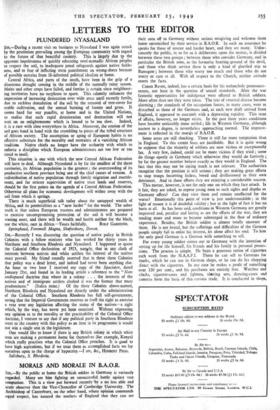SIR,—Recently I was discussing the question of native policy in
British Colonies with a fellow minister who has worked for thirty years in Northern and Southern Rhodesia and Nyasaland. I happened to quote the Colonial Office declaration of 1923, nanyly, that in any clash of interests between natives and white settlers the interest of the natives must prevail. My friend roundly asserted that in these three Colonies that policy was a dead letter, and indeed had never been anything else. An hour or two later I received my copy of the Spectator, dated January 21st, and found in its leading article a reference to the "Now undisputed doctrine that where in a colony . . . the interests of the natives and of immigrant settlers clashed it was the former that must
predominate." (Italics mine.) Of the three Colonies above-named, Northern Rhodesia and Nyasaland are directly under the administration of the Colonial Office. Southern Rhodesia has full self-government, saving that the Imperial Government reserves to itself the right to exercise a veto over any legislation affecting the status of the natives—a right which, by the way, has never yet been exercised. Without expressing any opinion as to the morality or the practicability of the Colonial Office doctrine, I venture to say that if any political party in Southern Rhodesia went to the country with this policy as an item in its programme it would not win a single seat in the legislature.
One would like to know if there is any British colony in which white men are making a permanent home for themselves (for example, Kenya) which really practises what the Colonial Office preaches. It is good to have high aspirations, but if we treat them as accomplished facts we lay ourselves open to the charge of hypocrisy.—I am, &c., HERBERT PEGG.
Salisbury, S. Rhodesia.


































 Previous page
Previous page